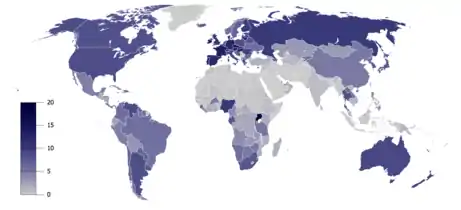Alcohol in Iran
Alcohol in Iran prohibited for Iranian citizens by law since the establishment of Islamic Republic government in 1979.[1]
In 2017, 5.7% of the adult population were found to have consumed alcohol in the previous year.[2]
History
Wine has played an important role in Persian culture and history ranging from administration of the earliest empires to religion and Persian literature.[3]
Law
Under the law, it is forbidden for Iran's Muslim citizens to consume alcohol. Much of the alcohol consumed by Iranian citizens is smuggled from Iraqi Kurdistan into Iran.[4]
Allowances for non-Muslims
Additionally officially recognized non-Muslim minorities are allowed to produce alcoholic beverages for their own consumption and for religious rites such as the Eucharist. Two of the four religious minorities guaranteed representation in the parliament (Majlis) – the Armenians and Assyrians – are Christian, the former being chiefly Armenian Apostolic.
This practice is not respected in some political cases, such as that of Afarin Neyssari and her husband, Karan Vafadari, as they have been arrested, among other charges, for having and serving alcohol during the mixed gatherings in their home though they are Zoroastrians, a monotheistic religion that predates Islam.[5]
Bringing alcohol into Iran is banned.
Drunk driving
In 2011-2012, the Iranian Traffic Police withdrew the driving licenses of 829 drivers, including 43 women, who had failed to pass alcohol and drug tests. Alcohol tests taken from drivers in Tehran in the period of 20 April-20 May 2012 showed that 26% of them were drunk.[6] Because the country has no discothèques or nightclubs, it all takes place at home, behind closed doors.
Punishment
In 2020, a Muslim man was executed at Mashhad prison after being convicted of drinking alcohol for the sixth time, driving without a license and being in possession of alcohol.[7]
Illegal sources
The 2010 study Substance Use Among Migrants: The Case of Iranians in Belgium notes that alcohol is acquired illegally in three different ways: purchased from ethnic minorities (particularly Armenians), personal home production including adding fermentants to non-alcoholic beer, or illegal imports largely through Iraq.[8]
Alcohol poisoning is quite common because illegal alcohol is often sub-standard. There were 768 cases of hospitalisation due to methanol poisoning in eight provinces in Iran over the course of 4 weeks in late 2018. 96 of the patients died.[9]
Non-alcoholic alternatives
Iran's prohibition of alcoholic drinks creates a large demand for non-alcoholic beer. Anti-smuggling plans by the Iranian Government, coupled with awareness campaigns against the consumption of cola carbonates and campaigns encouraging the drinking of non-alcoholic beer, further boosted demand in 2010. More young adults in Iran are interested in non-alcoholic beer, following widespread media coverage regarding its health benefits. These health advantages play a major part in the promotional activities of most major firms.[10]
Public health
The Ministry of Health and Medical Education has developed a national programme to reduce alcohol consumption by 10% between 2015 and 2025, but the religious-driven zero-tolerance alcohol policy impedes the development of an effective harm-reduction approach.[11]
See also
- Persian wine
- Aragh sagi, an alcoholic beverage
- Beer in Iran
- Healthcare in Iran
References
- Marjolein Muys (1 April 2010). Substance Use Among Migrants: The Case of Iranians in Belgium. Asp / Vubpress / Upa. pp. 78–. ISBN 978-90-5487-564-2.
- "A public health approach to alcohol use and its related harms in Iran". Lancet. 1 April 2019. Retrieved 13 May 2019.
- J.B. (28 September 2016). "Why wine is integral to Persian culture". The Economist. Retrieved 28 September 2016.
- Saeed Kamali Dehghan (25 June 2012). "Iranian pair face death penalty after third alcohol offence | World news". London: The Guardian. Retrieved 2013-06-11.
- "Family Breaks Silence as Iran Detains Owners of Tehran's Aun Gallery". www.artforum.com. Retrieved 2018-05-28.
- Pourparsa, Parham (2012-06-20). "BBC News - Iran's 'hidden' alcoholism problem". Bbc.co.uk. Retrieved 2013-06-11.
- https://english.alaraby.co.uk/english/news/2020/7/10/iranian-man-executed-for-drinking-alcohol-says-rights-group
- "Alcohol in Iran: All You Need to Know | 1stQuest Blog". 1stQuest Blog. 2018-05-30. Retrieved 2018-06-14.
- "A public health approach to alcohol use and its related harms in Iran". Lancet. 1 April 2019. Retrieved 13 May 2019.
- "Alcoholic Drinks in Iran". www.euromonitor.com. Retrieved 29 May 2011.
- "A public health approach to alcohol use and its related harms in Iran". Lancet. 1 April 2019. Retrieved 13 May 2019.
